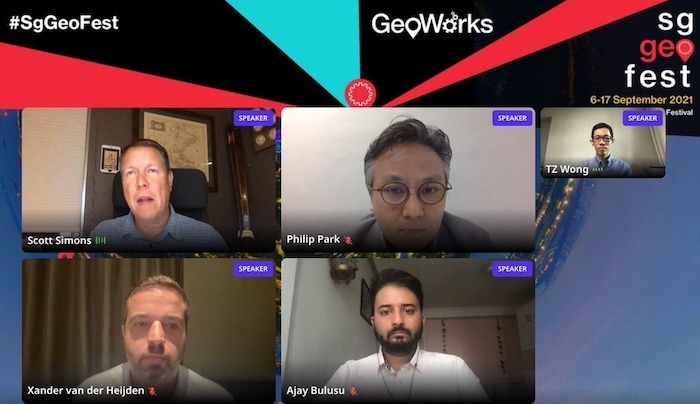
|
Home >
Settings >
Archives >
October 2021 >
SgGeoFest 2021: Panel on Innovating Maps
SgGeoFest 2021: Panel on Innovating Maps

Maps, to many people, are fundamentally about finding where one is, one’s location and about navigating from point A to point B, said TZ Wong, Head of Industry Analyst Relations, Asia Pacific at HERE Technologies. This, however, has progressed.
“There's a lot of innovation happening in terms of maps. It's not just a simple map anymore especially for enterprises who depend on the map, location data and intelligence to deliver value to their customers,” he added. Mr Wong was moderating a panel on innovating maps during the Singapore Geospatial Festival 2021 #SgGeoFest.
Mr Wong asked the panellists to share insights on innovations that they have observed. Speakers at the session were Philip Park from FATOS, Ajay Bulusu from NextBillion.ai, Scott Simmons from Open Geospatial Consortium (OGC) and Xander van der Heijden from UNL://.
Data, said Mr Bulusu, co-founder of NextBillion.ai, has been “democratised to a large extent”. One would normally have to carry out costly survey exercises to build maps. “But currently we don't see the need for it anymore. It's more about every company has enough data to have their own map.” He added that “anything location is seeing a lot of efficiency gains on the bottom line”.
|
“There's a lot of innovation happening in terms of maps. It's not just a simple map anymore especially for enterprises who depend on the map, location data and intelligence to deliver value to their customers.”
– TZ Wong,
Head of Industry Analyst Relations,
Asia Pacific, HERE Technologies
|
Xander van der Heijden, CEO of UNL://, said that the innovation he has seen in the mapping industry are mainly focused on data content and visualisation. He also said that there will be a wave of innovation from the mapping industry in the coming years as new players enter the markets. However, he added that it would be more interesting to look at what is driving the acceleration of innovation.
“With the rise of new technology like autonomous cars, connected cars, drones, robotics and 5G but also the pandemic’s impact and climate are driving innovation in the geo space. Mapping is becoming more and more key to all of these technologies to be successful. Micro and hyper local data are crucial for these tech to work properly. So it's exciting times for the mapping and geospatial industry as this is all related to us and we play a crucial role in the evolution of these technologies,” said Mr van der Heijden.
His definition of innovation, said Mr Parks, Director of ASEAN Business at FATOS, is that “innovation is our life”. “It's like Apple. Let's say Steve Jobs brought about innovation because it's not about the technology. It's about how we use technology as a part of our life,” Mr Parks explained. “So I think based on the definition of innovation, technology give us more flexibility, more accessibility, more feasibility to our use of technology.
“We will face more and more frequent small magnetic innovation but maybe there must be some breakthrough innovations in a certain point of time. But i think our life is all really filled up by all these small little innovations, step-by-step, one-by-one with different use cases, different contents and context.”
|
“With the rise of new technology like autonomous cars, connected cars, drones, robotics and 5G but also the pandemic’s impact and climate are driving innovation in the geo space. Mapping is becoming more and more key to all of these technologies to be successful. Micro and hyper local data are crucial for these tech to work properly. So it's exciting times for the mapping and geospatial industry as this is all related to us and we play a crucial role in the evolution of these technologies.”
– Xander van der Heijden, CEOUNL://
|
Scott Simmons, the OGC’s Chief Standards Officer said that technology is advancing rapidly and that the “capabilities we're getting from this are probably faster than any of us ever anticipated”.
“It's not just that we are creating data that's relevant to all of our users. It's that we in the community are also developing those applications against the data that are completely novel,” said Mr Simmons.
The speakers also discussed the current technology of maps, and how it will evolve for both mainstream public and enterprises.
View recording here.